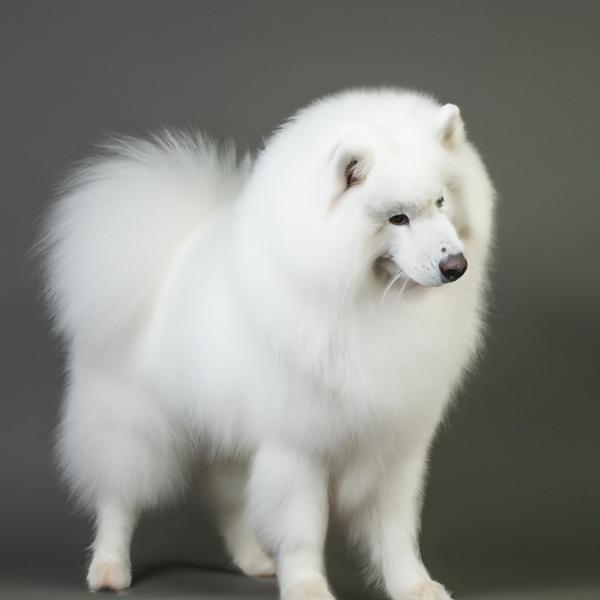Samoyed
also known as Bjelkier, Samoyedskaya, Sammy, Samoiedskaya Sobaka, Smiley, Nenetskaya Laika

 History
History
The Samoyed, a breed of fluffy white dogs with perky ears and a friendly disposition, has a rich and colorful history that spans centuries. These hardy and versatile dogs have played a significant role in the lives of the Samoyedic people, a nomadic reindeer-herding tribe that has long inhabited the harsh and snowy regions of Siberia.
The Samoyedic people, also known as the Samoyeds or the Samoyede, have used these dogs for a variety of purposes, including herding reindeer, hunting, guarding livestock, and even pulling sleds. They also relied on them for warmth and companionship, often sleeping with them in the same tent to keep warm during the harsh winter months.
The breed was first recognized by the Kennel Club in Great Britain in 1909, and later by the American Kennel Club in 1906. This recognition led to the breed's popularity as a pet and working dog.
The breed's name, "Samoyed," is derived from the Samoyedic people, who have long been associated with these dogs. The breed was created by the Samoyedic people themselves, who have been selectively breeding them for thousands of years to suit their needs and the harsh conditions of their environment.
Breed Information
Is Samoyed a purebred?
Purebred
What were Samoyeds originally used for?
herding reindeer, guarding, hauling sleds
How Long Do Samoyeds Live? What is average life expectancy for a Samoyed? How long can Samoyeds live?
12-14 years
The average Samoyed lifespan is somewhere between 12-14 years, provided they aren't beset by any exceptional health issues or injuries.
Samoyed Height & Weight
How big is a full grown Samoyed?

| Height | ||||
|---|---|---|---|---|
| Average | 6 months | 12 months | 18 months | |
| Male | 21-23 inches (53.3 - 58.4 cm) | 18.5 inches (47 cm) | 22.0 inches (55.9 cm) | 22.0 inches (55.9 cm) |
| Female | 19-21 inches (48.3 - 53.3 cm) | 17.0 inches (43.2 cm) | 20.0 inches (50.8 cm) | 20.0 inches (50.8 cm) |
| Weight | ||||
|---|---|---|---|---|
| Average | 6 months | 12 months | 18 months | |
| Male | 45-65 pounds (20 - 29 kg) | 30.0 pounds (14 kg) | 42.5 pounds (19 kg) | 55.0 pounds (25 kg) |
| Female | 35-50 pounds (16 - 23 kg) | 27.5 pounds (12 kg) | 37.5 pounds (17 kg) | 42.5 pounds (19 kg) |
Do Samoyeds get fat easily?
![]()
![]()
![]()
![]()
![]()
The Samoyed is a breed that has an average to high tendency to gain weight if their weight is not closely monitored. It is important to maintain a balance between exercise and food intake to keep them at a healthy weight. This can be achieved by scheduling at least one daily walk and engaging in regular playtime with them.
Are Samoyeds Hypoallergenic?
Yes
While no dogs are truly 100% hypoallergenic, Samoyeds are about as close as it gets, making them an ideal pet if you are an allergy sufferer.
What is a Samoyed personality? What are Samoyed dogs best known for?
Alert
Friendly
Playful
Stubborn
Lively
Intelligent
Sociable
Are Samoyeds heavy shedders? How Much Does a Samoyed Shed?
![]()
![]()
![]()
![]()
![]()
Samoyed dogs are extremely heavy shedders, they will lose a large amount of hair each year. To decrease the amount of shedding, you can regularly brush your Samoyed.
What is the watchdog ability of a Samoyed dog?
![]()
![]()
![]()
![]()
![]()
Samoyeds are very good watchdogs. They are a vocal breed, and are wary of outsiders, so if someone approaches your home or aims to intrude, the Samoyed is going to make sure everyone knows about it.
Breed History
Where do Samoyeds come from?
Russia
What are Samoyeds descended from?
spitz
What organizations or kennel clubs recognize/register the Samoyed breed?
American Canine Registry
American Kennel Club
America's Pet Registry
Canadian Kennel Club
Dog Registry of America Inc.
Federation Cynologique Internationale
Kennel Club of Great Britain
North American Purebred Registry, Inc.
American Canine Association, Inc.
Australian National Kennel Council
Continental Kennel Club
National Kennel Club
New Zealand Kennel Club
United Kennel Club
When were Samoyeds first bred? How old is the Samoyed breed?
ancient times
What Breed Group is a Samoyed?
Working (AKC:1906)
Northern Breeds (UKC)

Samoyed Appearance
What color are Samoyed eyes?
Brown
What color can Samoyed nose be naturally?
Black
What color can Samoyed coat be naturally?
White
Cream
How long is a Samoyeds coat?
![]()
![]()
![]()
![]()
![]()
The coat of a Samoyed is longer than that of the typical dog.
How Dense Is The Samoyed Coat?
![]()
![]()
![]()
![]()
![]()
What is the texture of the hair of a Samoyed?
Straight
How many puppies can a Samoyed have in a litter? How many puppies can a Samoyed have in her first litter?
12-14 puppies per pregnancy
A Samoyed can have a litter of 12-14 puppies on average. However, it's worth noting that the size of the litters can vary greatly. Factors that can influence litter size include the health of the mother, breeding history, and genetics.
![]()
![]()
![]()
![]()
![]()
The adaptability of Samoyed dogs is a well-known trait, they are known for being able to adjust well to different living environments and lifestyle changes.

Samoyed Health Issues
Do Samoyeds have a lot of health problems?
![]()
![]()
![]()
![]()
![]()
The Samoyed is generally considered to be healthy. However, like all breeds, they are susceptible to certain health issues and it is important to keep an eye out for them and address them with your veterinarian as needed.
What are the major health concerns to be aware of when owning a Samoyed?
Hip Dysplasia
What are the less significant issues to keep in mind when it comes to Samoyeds?
Progressive Retinal Atrophy
Allergies
What are the occasional tests recommended for Samoyed breed?
Eye
Hip
X-Rays
Eye Examination
Physical Examination
Allergy Tests

Samoyed Needs and Activities
Do Samoyeds have a lot of energy?
![]()
![]()
![]()
![]()
![]()
Samoyeds are high-energy dogs, thus an active lifestyle suits them well.
Do Samoyeds need socialization? How social are Samoyeds?
![]()
![]()
![]()
![]()
![]()
Samoyed have above average social needs compared to other breeds.They thrive in environments where they have a lot of interaction with humans and other dogs.
How much exercise should Samoyeds get?
![]()
![]()
![]()
![]()
![]()
The Samoyed dog needs significant physical activity to maintain a healthy lifestyle. They are also well-suited for those who lead an active lifestyle and enjoy activities such as running, hiking, or other outdoor pursuits.
How much sleep should a Samoyed have? Do Samoyeds sleep a lot?
![]()
![]()
![]()
![]()
![]()
Samoyeds are active dogs that don't require as much sleep as other breeds. However, they still need enough sleep to stay healthy.
Does a Samoyed drool a lot?
![]()
![]()
![]()
![]()
![]()
The Samoyed is a dog that is known for its low drooling tendency. If you dislike drool marks on your clothing, the Samoyed could be a suitable choice for you.
How much does it bark?
![]()
![]()
![]()
![]()
![]()
Samoyeds tend to bark moderately, they bark when necessary, such as to alert their owner or to communicate something. They may also bark due to certain triggers like fear, alarm, boredom, greeting, separation anxiety and compulsive barking.
Do Samoyeds exhibit aggressive behavior to safeguard their home and territory? Do they possess a natural tendency to guard?
![]()
![]()
![]()
![]()
![]()
These dogs are known for being extremely protective and make excellent guard dogs. They possess a strong instinct to defend their territory and owners and have a high level of vigilance and alertness.
Are Samoyeds mouthy?
![]()
![]()
![]()
![]()
![]()
What is the likelihood of a Samoyed running away? Do they have a tendency to explore or wander frequently?
![]()
![]()
![]()
![]()
![]()
Do Samoyed dogs have a high prey drive?
![]()
![]()
![]()
![]()
![]()
What do Samoyeds enjoy doing? How do I keep my Samoyed busy?
Talking, Barking, Ear rubs, Butt scratches, Sniffing, Eating, Being talked to, Walk, Run, Play, Petting, Go on Vacation, Catch treats, Shake, Heel, Walking, Playing catch, Smiling, Chasing, Running, Eating Snacks, Hiking, Tug, Swimming, Fetch, Snuggles, Go to Beach, Go to Park, Groom, Play fetch
What is the energy level of a Samoyed? How much energy does a Samoyed have?
Medium
Samoyeds are medium-energy dogs and typically enjoy socializing and playing casual or even sustained games of chase with other dogs. They may also have occasional periods of barking or racing around the house.
![]()
![]()
![]()
![]()
![]()
How far should a Samoyed walk each week? How many miles should a Samoyed walk every week?
8 miles / week
There's really no limit to how far you walk your dog as long as they're comfortable. For Samoyed, it's at least 8 miles / week. Just remember to build distance and stamina gradually over time.
How much a Samoyed should exercise a day? How much activity does a Samoyed need?
60 minutes
In general most Samoyeds usually need at least 60 minutes of exercise daily. This can be spread across the day and include all sorts of high-energy activities, like walking, running and playing.
What level of grooming should be provided for a Samoyed?
![]()
![]()
![]()
![]()
![]()
The Samoyed is a breed of dog that requires a significant amount of grooming. They will also require regular trims, and a professional groomer's help is often necessary to keep their coat in good condition. They may also need regular baths to maintain their coat and skin.
How often should you brush a Samoyed?
Weekly
Samoyed should be brushed at least once a week. Of course you can give them more frequent brushes if you find that they are still shedding a lot
What are the most commonly used brushing tools for Samoyeds?
Pin Brush
Comb
Nail Clipper
Costs
How many cups of food does a Samoyed eat?
2.8 cups
For an average 45-65 pound (20 - 29 kg) Samoyed feed 2.8 cups daily. But, keep in mind, the amount you feed is going to be dependent on the quality of the food you are feeding.
How Much Does a Samoyed Cost Daily?
$1.70 - $2.00 / day
The average cost of a Samoyed is somewhere $1.70 - $2.00 per day.
How Much Does a Samoyed Cost Per Month?
$48 - $63 / month
The average per month expenses of a Samoyed is between $48 - $63. This makes an average of $576 - $756 per year. It will be on the higher side when the dog is still small because it will need more frequent visits to the vet, shots.
Samoyed Characteristic
How intelligent is a Samoyed?
![]()
![]()
![]()
![]()
![]()
The Samoyed breed is considered very intelligent and easy to train.
How sensitive is a Samoyed dog?
![]()
![]()
![]()
![]()
![]()
Samoyed dogs are a less sensitive breed known for their adaptability and resilience. They tend to be less affected by new environments, people and noises. They can make great companions for families or individuals looking for a balanced and less sensitive pet that are not as demanding as highly sensitive breeds.
Are Samoyed dogs affectionate?
![]()
![]()
![]()
![]()
![]()
Do Samoyed do well in apartments? Are Samoyeds good indoor dogs?
![]()
![]()
![]()
![]()
![]()
Samoyeds are dogs that do well in apartments with sufficient exercise, but they would really appreciate a small yard.
Are Samoyeds good with kids? Are Samoyeds good around children?
![]()
![]()
![]()
![]()
![]()
A Samoyeds typical characteristics indicate that this breed of dog is an ideal companion for kids and makes them family pets. Their gentle and protective nature and calm mentality make them gel along quickly with the younger humans
Are Samoyeds good for elderly?
![]()
![]()
![]()
![]()
![]()
Are Samoyeds good with cats? How friendly Samoyeds are toward cats?
![]()
![]()
![]()
![]()
![]()
Samoyeds are an average cat friendly dog. They do well with cats, even more if raised together from puppyhood,
Do Samoyed dogs get along with other dogs? Are Samoyeds OK with other dogs?
![]()
![]()
![]()
![]()
![]()
Samoyeds are friendly, active and loyal companions. They generally love to be around other dogs, making them a good family pet for some,
How do Samoyed dogs interact with other pets? Are they considered pet-friendly?
![]()
![]()
![]()
![]()
![]()
Are Samoyeds friendly with strangers?
![]()
![]()
![]()
![]()
![]()
Samoyeds are average friendly around strangers. They can be wary around strangers and a little standoffish. Early socialisation is key.
Do Samoyeds like to play? Are Samoyeds playful?
![]()
![]()
![]()
![]()
![]()
Samoyeds have an average level of playfulness. The Samoyeds, like other dogs, like to play. But they are not the most playful dog breed.
Are Samoyed easily trained?
![]()
![]()
![]()
![]()
![]()
Samoyed dogs are known for their ease of training and ability to learn quickly, making them a popular choice for pet owners and trainers alike.
 Pros & Cons
Pros & Cons
Pros
- Hypoallergenic
Those with allergies should be happy with a Samoyed, as they have a low tendency to cause allergic reactions. - Lack of odor
The Samoyed has a minimal likelihood of having a bad smell. - Friendly
Samoyeds are known for their friendly and sociable nature. - Energetic
They are energetic and playful, making them great for active families.
Cons
- Tendency to gain weight
A Samoyed's weight can easily become an issue if left unchecked. - Shedding
Samoyed dogs are prone to shedding more than most breeds. - Not suitable for office environment
Samoyeds may not thrive in an office setting - Size
Samoyeds are large dogs and require a lot of space.